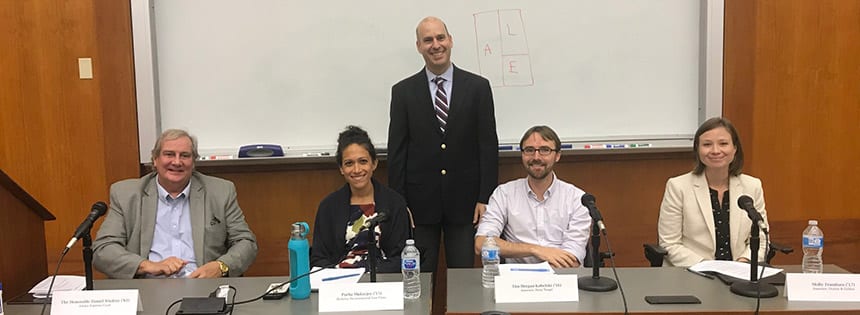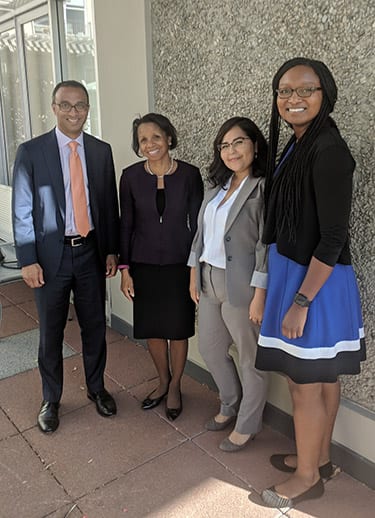
By Andrew Cohen
With packed student gatherings and 100 graduates currently clerking for judges around the country, Berkeley Law’s annual Judge Week continues to gain momentum.
The week’s events offered students valuable face time with members of the bench. It included the Judges-in-Residence program, this year with federal district court judges Wilhelmina Wright (Minnesota) and Amit Mehta (District of Columbia), and a visit from Alaska Supreme Court Justice Daniel Winfree ’81.
Bonifacio Sison ’20, co-president of the school’s Association of Military & Veterans and Pilipino American Law Society, helped lead a discussion with Wright and Mehta before leaders of various student affinity groups and journals. During last year’s Judge Week, he met Lorna Schofield—the first and only Filipina-American federal judge.
“As a law student and first-generation professional, it can be intimidating to be around judges,” Sison says. “The opportunity to meet Judge Schofield and learn her story … opened my eyes to what was possible. That exposure within the first few months of entering law school was critical for me.”

During the week, the judges fielded questions about clerkship applications, clerks’ daily tasks, and their exposure to various litigating styles. “I walked away with a better sense of what judges and their clerks do and grateful that such a program exists at our law school,” Sison says.
Wright and Mehta met with faculty, students, graduates with upcoming clerkships, alumni judges, and Dean Erwin Chemerinsky. Their classroom visits included Mehta appearing in an Evidence class taught by Professor Andrea Roth, his former co-worker at the Public Defender Service.
Students also attended a lunch presentation with Winfree and three alums who clerked in state courts: Purba Mukerjee ’15, Tim Horgan-Kobelski ’16, and Molly Frandsen ’17.
Berkeley Law established the Judge-in-Residence Program and Judge Week six years ago partly “to ensure that all 1Ls had the chance to meet with and hear from members of the bench during their very first semester,” notes Eric Stern, deputy director of the school’s Career Development Office.
He says the programs seek to reinforce clerking as “a career path open to all Berkeley Law students, whether they’re the first in their families to graduate from college or if previous to law school they’d never heard of a clerkship. The judges who participate provide invaluable mentoring, support, and encouragement to our students.”
Inside scoop
Stern moderated an eye-opening discussion with Wright and Mehta, who shared their paths to the bench, tips on landing clerkships, and how they can accelerate career goals. The conversation reaffirmed some notions and debunked others.
The judges acknowledged the importance of grades, writing experience, and a meaningful letter of recommendation, and that clinic, journal, and moot court experience are all helpful. Wright raised some eyebrows, however, when stating that candidates with connections to her court’s location or plans to practice in that area “don’t gain any advantage in their applications.”
She and Mehta also urged applicants to be authentic in their cover letter and interview. “Show your full personality and don’t leave anything on the table,” Mehta said. “If you’re funny, try to make a joke. And if you’re not funny, don’t.”
Both active in their communities, serving on nonprofit boards and other civic matters, the judges also emphasized work-life balance amid the legal profession’s demands.
“It’s so important to engage in activities beyond the law and interact with people who aren’t lawyers,” Wright said. “Get outside the adversarial process and help promote those who normally don’t have a seat at the table.”
Each judge described an intimate working environment with their clerks, advantages future litigators gain from seeing a judge’s decision-making process up-close, and an optimal forum for improving one’s legal writing.
“The hardest part of process is getting foot in the door,” Mehta said. “Take time to learn about the judges you’re interested in clerking for and include in your cover letter content that shows you’ve researched their background. When someone makes that effort, it stands out.”
Noting the varied benefits of working for a judge, Wright said lawyers “really respect clerkships. That experience in a court and the fact that a judge entrusted you at an early stage in your career gives senior lawyers and business professionals reason to trust your judgment and abilities.”